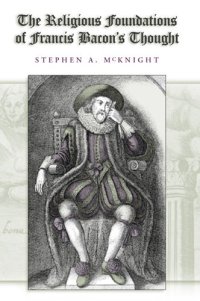
Ebook: The Religious Foundations of Francis Bacon's Thought
Author: Stephen A. McKnight
- Series: The Eric Voegelin Series in Political Philosophy
- Year: 2006
- Publisher: University of Missouri Press
- Edition: 1
- Language: English
- pdf
In this important study, Stephen A. McKnight investigates the relation of Francis Bacon’s religious views to his “instauration,” or program for reforming and advancing learning in order to bring “relief to man’s estate.” McKnight provides close textual analyses of eight of Bacon’s texts in order to establish the religious themes and motifs that pervade his writings from 1603 to 1626. Such analysis is necessary because there are so many contradictory interpretations of the same key texts and because prevailing scholarship often ignores Bacon’s religious ideas or dismisses them as part of the cultural images that Bacon supposedly manipulated to conceal or disguise his modern, secular, materialistic, and rationalistic views. McKnight begins with the New Atlantis because it offers the fullest articulation of Bacon’s vision of instauration and because the principal religious themes in Bacon’s writings are all contained within it. Next, he turns to The Great Instauration and The New Organon to show the centrality of religious concepts in two of Bacon’s major philosophical works. He then examines five of Bacon’s early published and unpublished works, including The Advancement of Learning and Wisdom of the Ancients, to demonstrate that religious imagery and biblical themes permeate Bacon’s program of reform from the outset. McKnight maintains that Bacon’s vision of reform is drawn from the Judeo-Christian Scriptures, particularly the Genesis account of the Creation and the Fall; from apocalyptic expectation of renewal in the Old Testament; and from salvation themes of the New Testament. He also demonstrates that Bacon’s Christian ideas are augmented and transmuted by related themes and imagery found in the prisca theologia, a mixture of Neoplatonism, Hermeticism, alchemy, magic, and Jewish esoteric traditions. According to McKnight, Bacon believed that scholastic error and ecclesiastical dogma obscured religious truth and required a search for a truer, deeper level of understanding of the Scriptures and of God’s saving acts in history. The Religious Foundations of Francis Bacon’s Thought attempts to correct the persistent misconception of Bacon as a secular modern who dismissed religion in order to promote the human advancement of knowledge. This exploration suggests that the origins of modernity are much more complex than many current approaches allow and that modernity and the goals of science cannot be separated from the dream of a restoration of a prelapsarian relation of humanity, God, and nature.
Download the book The Religious Foundations of Francis Bacon's Thought for free or read online
Continue reading on any device:

Last viewed books
Related books
{related-news}
Comments (0)